Bitcoin
Bitcoin Faces Crucial US Economic Tests This Week

Bitcoin (BTC) faces a big week ahead as various key macroeconomic events are scheduled on the US calendar. The impact of these data releases on the crypto market has regained importance after a period of diminishing influence in the second half of 2023.
Crypto traders and investors should prepare for potential volatility as the week starts, with multiple impactful events lined up on the economic calendar.
Bitcoin Braces for US Economic Data: What to Watch
While the week’s major US economic reports calendar is packed with events, those that could impact Bitcoin and digital assets make the bulk of it. Among them is Donald Trump’s interview with Elon Musk.
Trumps Interview With Musk
Trump will engage Musk on Monday, August 12 via X spaces at 8 p.m. ET. The interview is expected to be unscripted and open to all topics, with Musk inviting everyone to submit questions they would like to see discussed. Musk is pro-Trump, with reports that the CEO of X created a Super PAC focused on supporting candidates who favor a meritocracy and personal freedom.
“Am going to do some system scaling tests tonight & tomorrow in advance of the conversation with Donald Trump,” Musk said on Sunday.
This comment is made given the platform’s spotty performance last year during an interview with Florida Governor Ron DeSantis. Indeed, this interview could have implications for Bitcoin and crypto after Trump’s bullish assertions during the Nashville conference. Both Trump and Musk are pro-crypto, which means the subject will likely spring up in the interview.
Core PPI (Wholesale Inflation)
On Tuesday, the US Bureau of Labor Statistics (BLS) will report July’s Core Producer Price Index (PPI). This data determines price increases at the producer level and influences financial markets by measuring inflation at the wholesale level. Specifically, increases in PPI indicate increases in production costs.
These increases could lead to growing energy and hardware costs requisite for mining and processing cryptocurrencies. A higher core PPI on August 13 could negatively affect Bitcoin and crypto.
Economists forecast a 2.2% year-over-year increase, four-tenths of a percentage point less than in June. The core PPI, which excludes volatile food and energy prices, is seen rising 2.7%, compared with 3% previously.
US CPI
The BLS is also scheduled to release the July Consumer Price Index (CPI) this week. This data measures the price increases in consumer goods and services. While the consensus call is for the CPI to increase 2.9% year over year, the core CPI is expected to rise by 3.2%, with both estimates being one-tenth of a percentage point less than the June figures.
An increase in the CPI may decrease consumers’ purchasing power. This could negatively affect Bitcoin and crypto markets because consumers may tend to spend less when purchasing power decreases.
Read more: How to Protect Yourself From Inflation Using Cryptocurrency
From another perspective, the decreased purchasing power of fiat currencies could lead to more people turning to alternative assets like crypto. Here, they see it as a means to protect their wealth. In this scenario, an increase in inflation, as indicated by the CPI, would potentially drive up the demand for Bitcoin and crypto in general, ultimately driving up their prices.
Initial Jobs Claims
The Census Bureau will report on the US jobs claims on Thursday, detailing July’s retail and food services sales data. Economists predict a 0.3% month-over-month increase relative to a flat reading in June.
Retail sales could gain 0.1% minus the sale of autos, which is three-tenths of a percentage point less than previously. Amid recession fears that have kept investors spooked recently, the market hopes to see continued resilience in consumer spending.
“Bitcoin and Ethereum tend to underperform during periods that resemble or approach a recession in the United States. Additionally, investors are reducing their positions as prices have fallen below the average entry point for ETF investors, which is approximately $60,000,” Markus Thielen, Founder and CEO at 10x Research, recently told BeInCrypto.
Consumer Sentiment Survey
Markets also brace for the University of Michigan’s August consumer Sentiment survey, which will be released on Friday. This data reflects the gap between the US economy’s continued strength and how households feel about their financial situation.
In July, consumers’ expectations of the year ahead inflation was 2.9%, which signified a near a 3-and-a-half-year low. Expectations for the August 16 release are for a 67.5 reading, about one point higher than previously.
Noteworthy, consumer sentiment is much more sensitive to inflation, while consumer confidence is more sensitive to the labor market. If the data shows consumers still struggle with inflation and high interest rates while worrying more about their jobs, crypto could react differently.
Ultimately, the relationship between crypto and US macroeconomics is not always straightforward. The market reacts to data releases in unexpected ways, which is determined by what transpires in the days leading up to the data release date.
For instance, traders could front-run the data if markets anticipate an increase for specific data. This means the immediate reaction in crypto prices may be different than expected.
Bitcoin Price Outlook
Meanwhile, Bitcoin is back in the $58,000 range after topping out at $61,858 on Sunday. While this volatility could be attributed to low trading volumes on the weekend, this week’s US economic data also has traders and investors on alert.
As BTC retraces to the demand zone, this order block could provide a good buying opportunity. However, this is contingent on the $55,313 level holding as a support floor on the one-day timeframe. Momentum indicators such as the Relative Strength Index (RSI) suggest a lack of conviction among bulls.
Perhaps positive developments from the US macroeconomic front could inspire bullish optimism. This could drive Bitcoin price back up and, with it, the broader cryptocurrency market.
Read more: How To Buy Bitcoin (BTC) and Everything You Need To Know
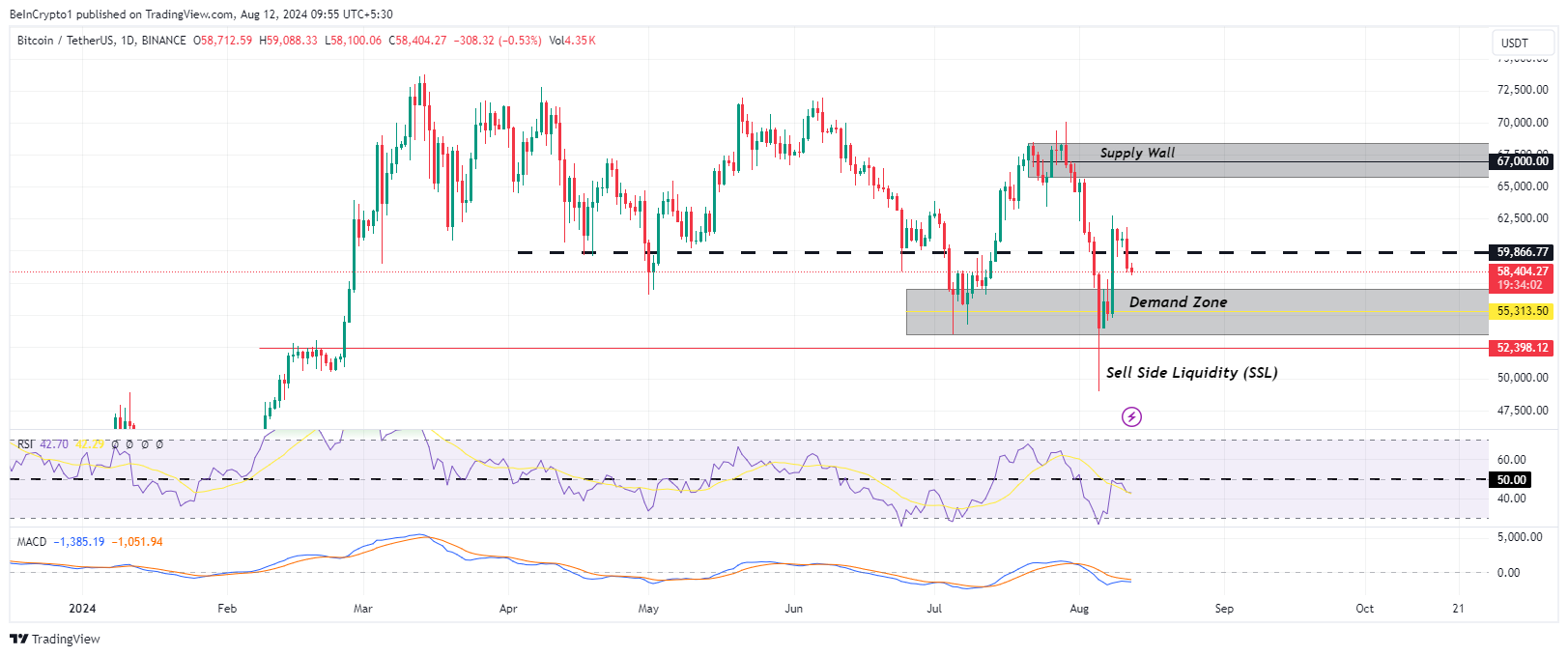
However, if the $55,313 threshold breaks as support, and the price closes below it on the daily timeframe, Bitcoin could roll over lower, potentially extending for a liquidity sweep below $52,398.
Disclaimer
In adherence to the Trust Project guidelines, BeInCrypto is committed to unbiased, transparent reporting. This news article aims to provide accurate, timely information. However, readers are advised to verify facts independently and consult with a professional before making any decisions based on this content. Please note that our Terms and Conditions, Privacy Policy, and Disclaimers have been updated.
Bitcoin
Why Bitcoin Is Gaining Appeal Amid Falling US Treasury Yields

The US 10-year Treasury yield has fallen below 4% for the first time since October.
This signals a potential shift in Federal Reserve (Fed) policy, sparking renewed interest in Bitcoin (BTC) and other risk assets.
Treasury Yields and Bitcoin: A Risk-On Rotation?
As highlighted by financial markets aggregator Barchart, this decline reflects growing economic uncertainty. Specifically, it suggests rising recession fears and increasing speculation that the Fed may pivot to rate cuts sooner than expected.
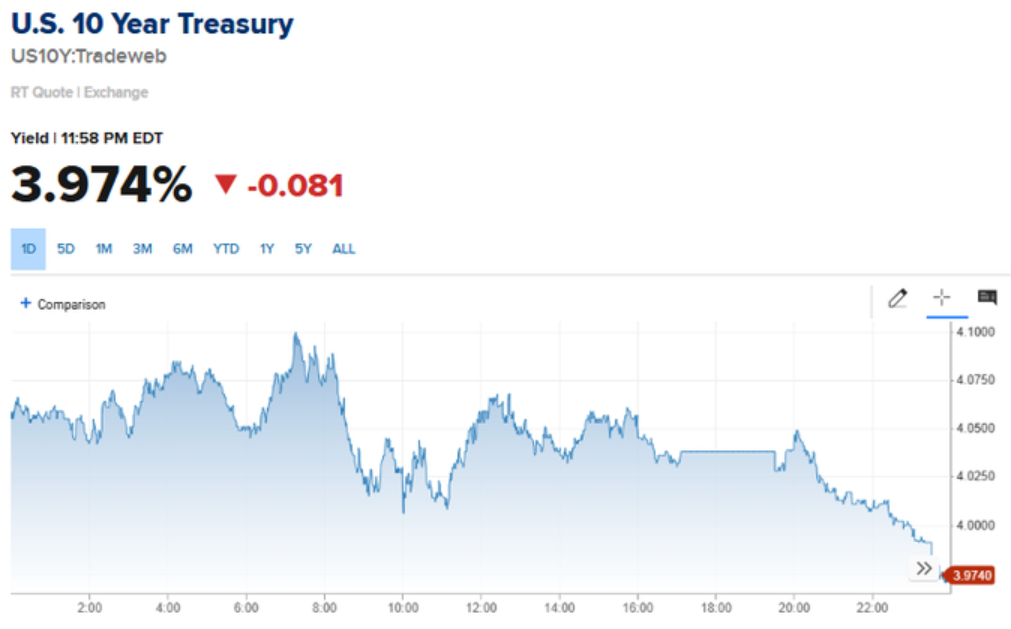
A drop in Treasury yields reduces the attractiveness of traditional safe-haven assets like bonds, often encouraging investors to seek higher returns elsewhere.
Historically, Bitcoin and altcoins have benefitted from such shifts, as declining real yields increase liquidity and risk appetite. Crypto analyst Dan Gambardello emphasized this connection. He noted that lower yields are bullish for Bitcoin, aligning with expectations that a dovish Fed will drive liquidity into riskier assets.
“The irony is that when yields fall, there’s less reason to sit in “safe” bonds— And ultimately more reason to chase returns in risk assets like BTC and alts. This is why you see risk-on bulls get excited when 10-year yields begin falling,” he stated.
Additionally, BitMEX founder and former CEO Arthur Hayes pointed out that the 2-year Treasury yield sharply declined after the new tariffs were introduced. He said this reinforced the market’s expectation of imminent Fed rate cuts.
“We need Fed easing, the 2yr treasury yield dumped after Tariff announcement because the market is telling us the Fed will be cutting soon and possibly restarting QE to counter -ve economic impact,” Hayes shared on X (Twitter).
Hayes previously projected that Bitcoin could surge as high as $250,000 if quantitative easing (QE) returns in response to economic downturns.
The Trump Factor: Tariffs and Market Volatility
Further, analysts have tied the yield drop to economic uncertainty triggered by Trump’s aggressive tariff strategy. As Gambardello noted, these tariffs have spurred a flight to safety, pushing bond prices higher and lowering yields.
This trend aligns with Trump’s broader economic approach of weakening the dollar and lowering interest rates, which historically benefit Bitcoin. During his first term, Trump frequently desired a weaker dollar and lower interest rates to boost exports and economic growth. He also pressured the Fed to cut rates multiple times.
Another analyst, Kristoffer Kepin, highlighted that the M2 money supply is growing. This reinforces expectations of increased liquidity entering the market further. This influx of capital could flow into Bitcoin and altcoins as investors seek alternative stores of value amid economic turbulence.
Despite Bitcoin’s potential upside, Goldman Sachs has recommended gold and the Japanese yen as preferred hedges against US recession risks. Specifically, the bank cited its historical performance in risk-off environments.
“The yen offers investors the best currency hedge should the chances of a US recession increase,” Bloomberg reported, citing Kamakshya Trivedi, head of global foreign exchange, interest rates, and emerging market strategy at Goldman Sachs.
The bank expressed the same sentiment toward gold, raising its forecast as investors buy the yellow metal. Similarly, a Bank of America (BofA) survey showed that 58% of fund managers prefer gold as a trade war haven, while only 3% back Bitcoin.
Meanwhile, JPMorgan has raised its global recession probability to 60%. Likewise, the multinational banking and financial services company attributed the increased risk to the economic shock from tariffs announced on Liberation Day.
“These policies, if sustained, would likely push the US and possibly global economy into recession this year,” wrote head of global economic research Bruce Kasman in a note late Thursday.
However, Kasman acknowledged that while a scenario where the rest of the world muddles through a US recession is possible, it is less likely than a global downturn.
As Treasury yields continue to fall and economic uncertainty mounts, the Fed becomes a key watch for investors for signs of a policy shift.
If rate cuts and liquidity injections materialize, Bitcoin could see substantial gains, particularly as traditional assets undergo re-pricing. However, as experts caution, short-term volatility remains a key risk factor amidst these market shifts.
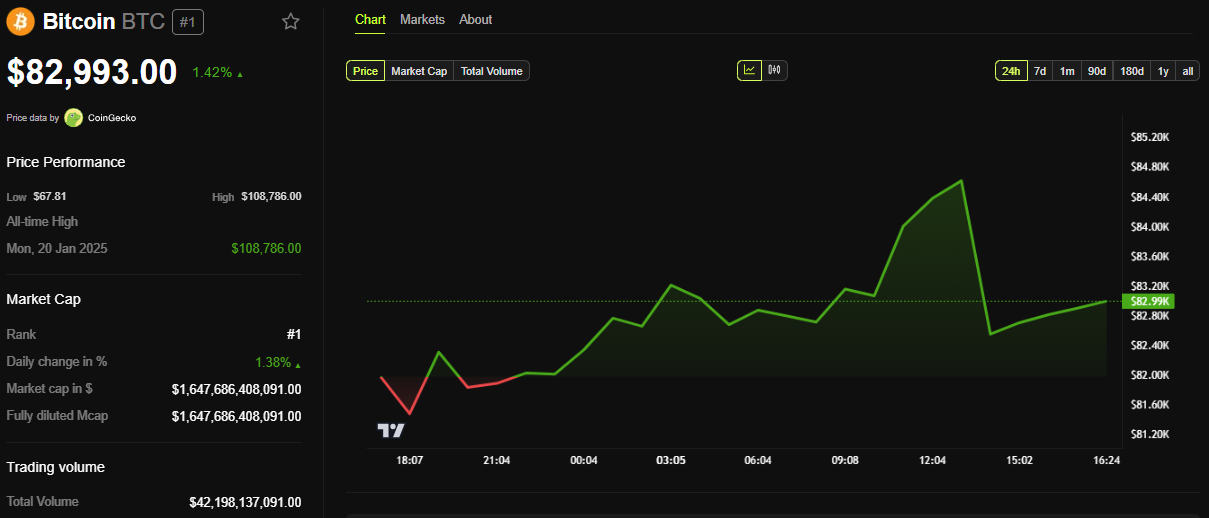
BeInCrypto data shows Bitcoin was trading for $82,993 as of this writing, up by a modest 1.42% in the last 24 hours.
Disclaimer
In adherence to the Trust Project guidelines, BeInCrypto is committed to unbiased, transparent reporting. This news article aims to provide accurate, timely information. However, readers are advised to verify facts independently and consult with a professional before making any decisions based on this content. Please note that our Terms and Conditions, Privacy Policy, and Disclaimers have been updated.
Bitcoin
Bitcoin Drops as China Escalates Trade War With 34% Tariff on US

On April 4, 2025, China responded to the latest US tariff imposition by imposing an additional 34% tariff on all goods imported from the US. This escalates the already tense trade war between the two largest economies in the world.
Bitcoin dropped 3% within hours of the announcement, briefly falling below $82,000. This latest development has caused concern among investors, analysts, and participants in the cryptocurrency sector about its potential impact.
Bitcoin Investors Worry About The Escalating Trade War
According to Xinhua News Agency, China will impose a 34% tariff on all products imported from the US starting April 10. Xinhua reported that the US’s “Reciprocal Tariff” violated WTO rules, severely damaging the legal and legitimate rights of WTO members and undermining the multilateral trade system and the international trade order based on rules.
“This is a typical act of unilateral hegemony that harms the stability of the global economic and trade order. China firmly opposes this,” The spokesperson for the Ministry of Commerce said in an interview about China’s lawsuit against the US’s “Reciprocal Tariff” at the WTO.
Previously, President Trump had imposed a 34% tariff on China in addition to the 20% tariffs already imposed in two phases. This means a total of 54% tariffs were applied to China.
News from China has caused concern among crypto investors. On April 4, Bitcoin’s price dropped from $84,600 to $82,000, a 3% decrease.
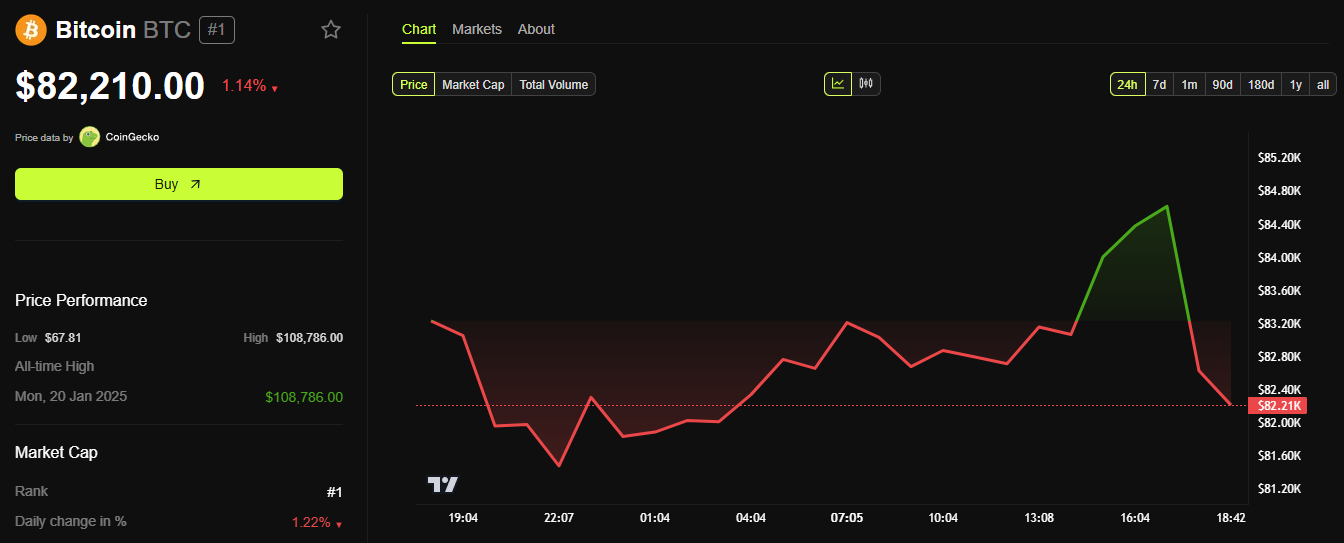
At the same time, following the news, the Long/Short ratio of Bitcoin dropped below 1, indicating a growing sentiment for short-selling, which has become dominant in the market.

Both Bitcoin and other markets have been affected. The S&P 500 fell from 5,260 points to 5,250 points, while the Dow Jones Industrial Average dropped from 41,100 points to 40,500 points. China’s actions have raised concerns about the potential escalation of the global trade war.
“The ‘Third World War’ of the trade war has begun,” The Kobeissi Letter commented.
What Will Happen to Bitcoin When The US-China Trade War Escalates?
This cryptocurrency, often praised as a hedge against economic instability, tends to behave like a risky asset during sudden uncertain periods. Historical patterns support this reaction—during the US-China trade war in 2018-2019, Bitcoin experienced significant sell-offs as tariffs escalated, only recovering when the narrative of value preservation took precedence.
A significant portion of the global cryptocurrency hardware supply chain comes from China, where companies like Bitmain dominate the production of ASIC mining machines—important devices for Bitcoin mining.
With the US now facing a 34% tariff on technology imports from China, the cost of importing these mining machines is expected to rise dramatically. Bitcoin miners in the US, already facing high energy costs and competitive pressure on hashrate, may see their profits shrink further.
However, the long-term outlook for Bitcoin may not be as bleak as the initial market reaction. Some analysts suggest that prolonged trade wars and economic friction could enhance Bitcoin’s appeal as a decentralized asset unaffected by government intervention. If tariffs lead to inflation or weaken fiat currencies like the USD, investors may turn to cryptocurrencies as a safe haven.
“It’s not gold, and it’s not the yen. Instead, Bitcoin is emerging as a risk-dynamic asset – one that doesn’t crumble like high-growth stocks but also doesn’t attract the same flight-to-safety flows as traditional safe havens,” Nexo Dispatch Editor Stella Zlatarev told BeInCrypto.
This sentiment aligns with research indicating that instability often causes initial price drops but can pave the way for growth as acceptance increases.
Disclaimer
In adherence to the Trust Project guidelines, BeInCrypto is committed to unbiased, transparent reporting. This news article aims to provide accurate, timely information. However, readers are advised to verify facts independently and consult with a professional before making any decisions based on this content. Please note that our Terms and Conditions, Privacy Policy, and Disclaimers have been updated.
Bitcoin
Fresh $36M Bitcoin Transfer By Bhutan Sparks Speculation—Dump Alert?
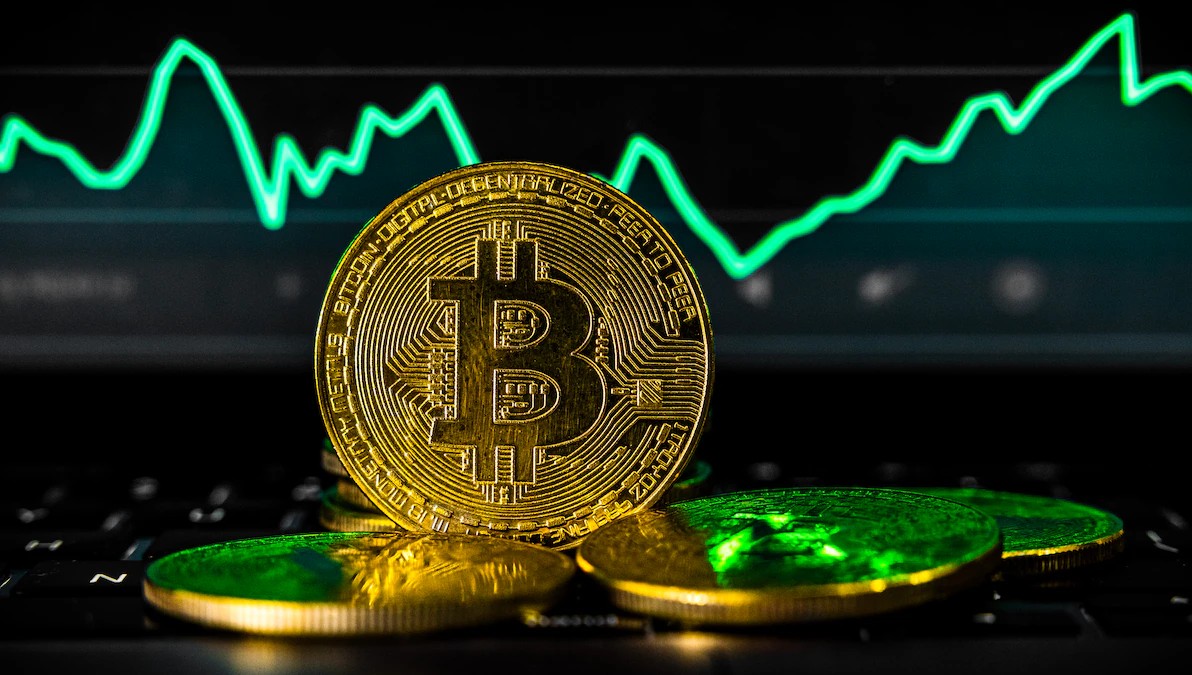

A series of Bitcoin transfers from wallets linked to the Bhutanese government has caught the attention of cryptocurrency watchers. According to blockchain data from Arkham, addresses tied to Druk Holdings, the commercial arm of Bhutan’s government, moved 419.5 Bitcoin worth approximately $34.51 million to an unidentified address on April 2.
Government Wallets Transfer Large Sum To New Address
Based on reports from Arkham, a blockchain analytics platform, two separate wallets believed to belong to the Bhutanese government participated in the transfer. The main Bitcoin holding wallet sent 377.8 BTC ($32.11 million) to a new address identified only as “bc1qn6.” A second wallet, labeled “34oXLr,” contributed an additional 41.7 BTC ($3.5 million) to the same destination.
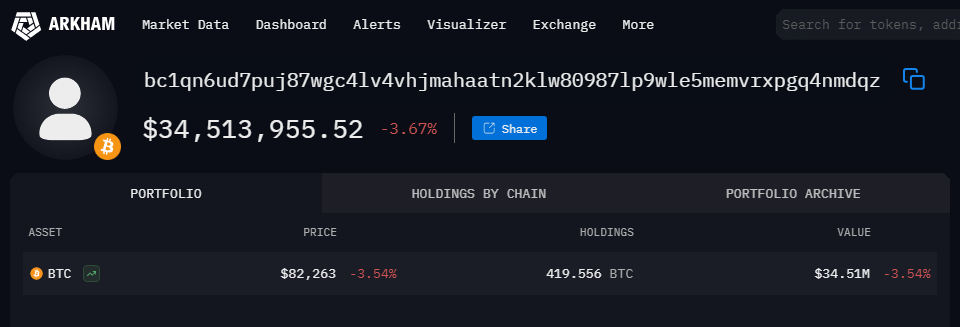

Source: Arkham
The funds remain in the new wallet at the time of this report. This movement follows a larger transfer last week when the government reportedly shifted 1,664 BTC ($144.57 million) to several different addresses.
Bhutan Maintains Significant Crypto Holdings
The Royal Government of Bhutan owns significant Bitcoin holdings, despite recent sales. Bhutan, based on Bitcoin Treasuries data, owns 13,029 BTC at a value of $1,061,269,247. This puts the nation fourth in total Bitcoin owned among countries, just behind El Salvador.

Source: Bitcoin Treasuries
The landlocked Buddhist-majority country has emerged as an offbeat contributor to the cryptocurrency world. Bhutan reportedly mines Bitcoin by leveraging its abundant hydroelectric resources. This most recent stockpile of cryptocurrency constitutes a sizable portion of the total economy — 31% of the country’s gross domestic product (GDP), estimated at nearly $3 billion.
Market Response Following The News
The cryptocurrency market appears unaffected by Bhutan’s Bitcoin movements. According to price data, Bitcoin recovered from a low of $81,014 to reach $82,005 before slightly pulling back. This represents a 2.5% rebound within a day.
The leading cryptocurrency traded at $82,401 at the time of the report, showing a nearly 1% increase over 24 hours. If this upward trend continues, Bitcoin could achieve its third consecutive positive daily close for the first time since early January.
While Bhutan has been selling off its Bitcoin for profit, the United States is seeking to stop all sales of their balance and even expand it. Interestingly, US President Donald Trump signed an executive order last month to establish a strategic Bitcoin reserve for the nation. In the meantime, senator Cynthia Lummis has filed the Bitcoin Act, seeking to acquire 1 million BTC for the nation.
Featured image from AD, chart from TradingView

Editorial Process for bitcoinist is centered on delivering thoroughly researched, accurate, and unbiased content. We uphold strict sourcing standards, and each page undergoes diligent review by our team of top technology experts and seasoned editors. This process ensures the integrity, relevance, and value of our content for our readers.
-
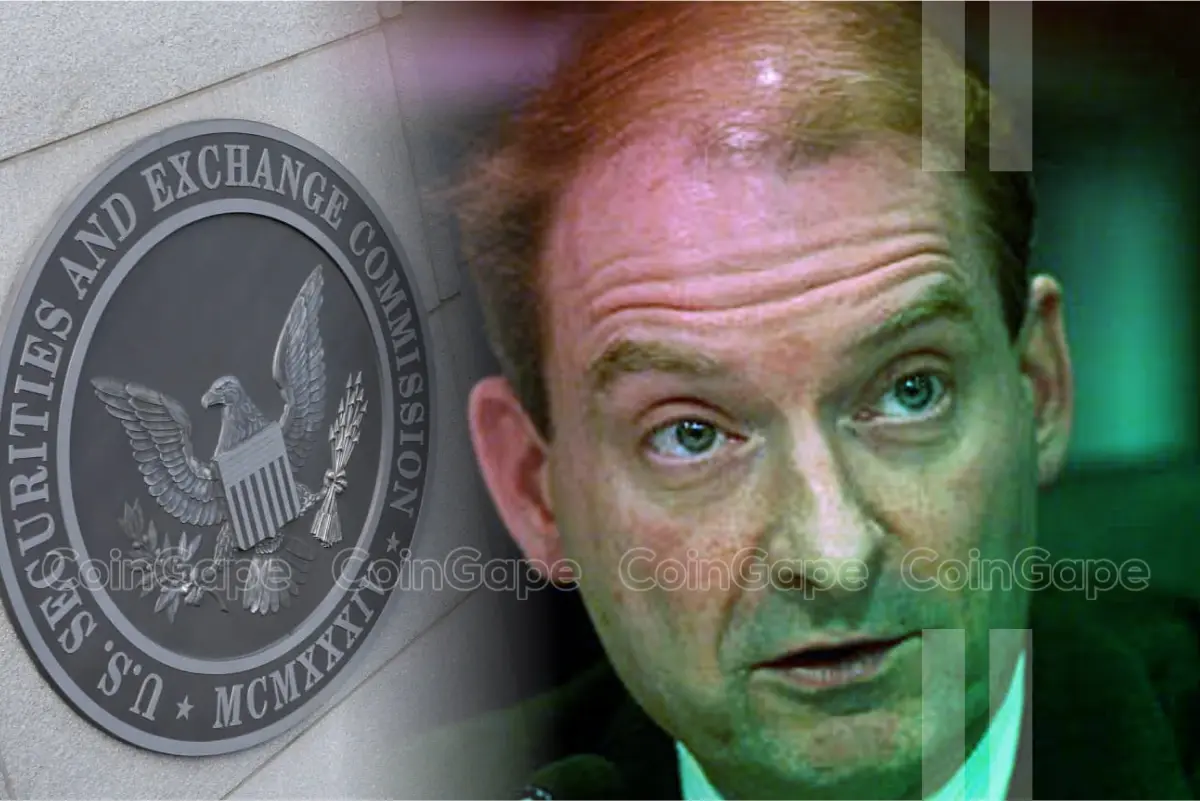
 Regulation23 hours ago
Regulation23 hours agoUS Senate Banking Committee Approves Paul Atkins Nomination For SEC Chair Role
-

 Market22 hours ago
Market22 hours agoBinance Managed 94% of All Crypto Airdrops and Staking Rewards
-
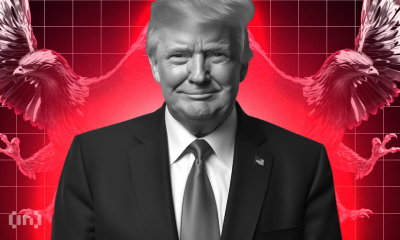
 Market24 hours ago
Market24 hours agoTRUMP Token Hits Record Low Due To Liberation Day Tariffs
-

 Market23 hours ago
Market23 hours agoPi Network Price Falls To Record New Low Amid Weak Inflows
-

 Regulation20 hours ago
Regulation20 hours agoUS SEC Acknowledges Fidelity’s Filing for Solana ETF
-

 Market19 hours ago
Market19 hours agoWormhole (W) Jumps 10%—But Is a Pullback Coming?
-

 Altcoin19 hours ago
Altcoin19 hours agoAltcoin Season Still In Sight Even As Ethereum Struggles To Gain Upward Momentum
-

 Market21 hours ago
Market21 hours agoXRP Battle Between Bulls And Bears Hinges On $1.97 – What To Expect




















